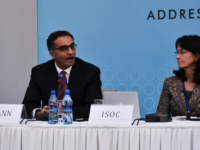The dot-org domain extension was established as one of the first top-level domains in 1985 alongside dot-com, dot-net and a handful of others. In 2002, administration over the domain was awarded to the Public Interest Registry (PIR), a non-profit established by the Internet Society (ISOC), to run the extension. PIR recently announced that it was being purchased by Ethos Capital, a private equity firm that includes a former CEO of ICANN among its founders. With a rumoured purchase price of over $1 billion dollars, there is big money for ISOC but the deal has left the non-profit community worried about potential price increases and policy changes to the domain that could impact online speech. Elliot Harmon, Activism Director with the Electronic Frontier Foundation, recently wrote about the issue and has been working on a campaign with NGOs around the world opposed to the deal. He joined on the podcast to discuss the background behind dot-org, the concerns with the sale, and what can be done about it.
Post Tagged with: "isoc"
CRTC Website Blocking Submissions Confirm Over-Blocking Risks: “Every Blocking Technique Suffers from Over-blocking and Under-blocking”
With broad-based criticism of the Bell website blocking plan, supporters have tried to dismiss the opposition by characterizing much of their analysis as “misinformation”. Yet a review of many expert submissions reveals widely held concerns regarding the proposal. Many point to the absence of court orders as a key flaw and no one – whether supporter or critic – disputes that the majority of countries that have used site blocking require court orders. Further, claims that human rights concerns are unfounded ring hollow in light of the critical submission from the U.N. Special Rapporteur on Freedom of Expression. Efforts to dismiss the cost implications of site blocking are undermined by the clear position of the majority of Canadian Internet providers that the expenses associated with blocking are likely to lead to increased consumer costs and reduced competition.
Many submissions similarly point to the risks of over-blocking legitimate content.








